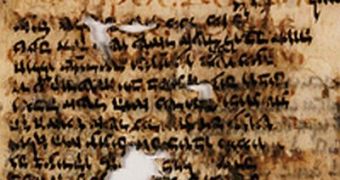A new study carried out by Cambridge University researchers has led to the discovery of a new chapter in the history of the Bible, giving researchers insight into a part of the Byzantine Jewish life and culture.
It seems that contrary to what was largely believed, Jews continued to use a Greek version of the Bible in synagogues for centuries longer, and in some areas, this practice continued almost until living memory.
Nicholas de Lange, Professor of Hebrew and Jewish Studies in the Faculties of Divinity and Asian and Middle Eastern Studies, led the three-year study to re-evaluate the story of the Greek Bible fragments.
He said that “the translation of the Hebrew Bible into Greek between the 3rd and 1st centuries BCE is said to be one of the most lasting achievements of the Jewish civilization - without it, Christianity might not have spread as quickly and as successfully as it did.
“It was thought that the Jews, for some reason, gave up using Greek translations and chose to use the original Hebrew for public reading in synagogue and for private study, until modern times when pressure to use the vernacular led to its introduction in many synagogues.”
These Cairo Genizah manuscripts were discovered in an old synagogue in Egypt and brought to Cambridge at the end of the 19th century, and the Cambridge University Library has been keeping them ever since.
The Professor did a close study of the Cairo Genizah fragments and found that some of them had passages from the Bible in Greek written in Hebrew letters.
Others contained parts of a lost Greek translation made by Akylas, a convert to Judaism, in the 2nd century AD.
The interesting thing is that these fragments date from 1,000 years after the original translation into Greek, which means that the use of the Greek text was still alive in Greek-speaking synagogues in the Byzantine Empire and elsewhere.
To this discovery were added manuscripts from other libraries, and it became clear that in the Middle Ages, a variety of Greek translations were used by Jews.
Professor de Lange said that “this is a very exciting discovery for me because it confirms a hunch I had when studying Genizah fragments 30 years ago.”
Now, all these manuscripts are gathered in an online corpus, making them available to other scholars for the first time.
The online resource was created after a collaboration between research teams at Cambridge University, including Dr Cameron Boyd-Taylor and Dr Julia Krivoruchko, and King's College London.
Paul Spence, leader of the team at the Center for Computing in the Humanities at King's said that “this ambitious piece of collaborative digital scholarship required challenging technical difficulties to be solved.
“It draws together a wide variety of materials under a standards-based framework which provides multiple entry points into the material.”
The research was funded by the Arts and Humanities Research Council.

 14 DAY TRIAL //
14 DAY TRIAL //